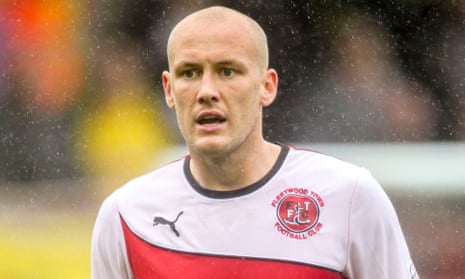The former Football League defender Ryan Cresswell has warned of the danger of players becoming addicted to sleeping pills after the problem nearly claimed his life.
Cresswell, whose clubs included Rotherham, Southend and Northampton, reached 12 months of sobriety earlier this summer after a second stint at the Sporting Chance rehab clinic and his life is now on the up. The 34-year-old is back working in football as manager of Sheffield FC – the world’s oldest club – and is feeling positive about his future.
It was a different story when his addiction began with painkillers to treat a chronic knee problem while he was at Northampton, then came the sleeping tablets, followed by alcohol and that is when his world came crashing down. After going into rehab for the first time there was a relapse and he was heading in a downward spiral and believes it was only an intervention from fate that saved him.
“Painkillers, sleeping tablets and drink. I was way out of my depth. I can’t believe I did what I did,” he said. “When I went into rehab for the first time I thought I hit a low but I hadn’t even dived in the pool.
Quick GuideHow do I sign up for sport breaking news alerts?
Show
- Download the Guardian app from the iOS App Store on iPhone or the Google Play store on Android by searching for 'The Guardian'.
- If you already have the Guardian app, make sure you’re on the most recent version.
- In the Guardian app, tap the Menu button at the bottom right, then go to Settings (the gear icon), then Notifications.
- Turn on sport notifications.
“When I went in the second time I was gripping on for dear life. It was a matter of life or death. I didn’t want to die. Some people have passing thoughts about not wanting to be here any more, I was living in those thoughts.”
Cresswell knows how easy it can be to become addicted to sleeping tablets and he is pretty sure he is not the only one in the game to be affected by it. “I think there is a big issue in football with sleeping tablets and I mean from the top, as high as you can go,” he said.
“For me iIt started with one after every game, which was great and I think is an alright purpose to use them. But then it went from one after games, to one a day to two a day and then I knew I was addicted to them. It was not me craving it, it was my body, I knew it wasn’t the right thing. It’s horrible.
“There will be 22- or 23-year-old lads now in the Premier League, Championship wherever taking too many painkillers. It will not be for another three years that they realise they have a real problem. The sweats and the shakes at night will come and they just have to get through it.”
After two stints in rehab, Cresswell has come through it, but knows he still has work to do. “I’ve not cracked it, I can’t think I’ve cracked it,” said Cresswell, who still attends regular Alcoholics Anonymous meetings. It’s an achievement that doesn’t need to be acknowledged because it’s the right thing to do. It isn’t an achievement, it is something that had to be done.
“If I can talk about what happened to me and it stops just one current player going through what I’ve done then that’s enough.”
